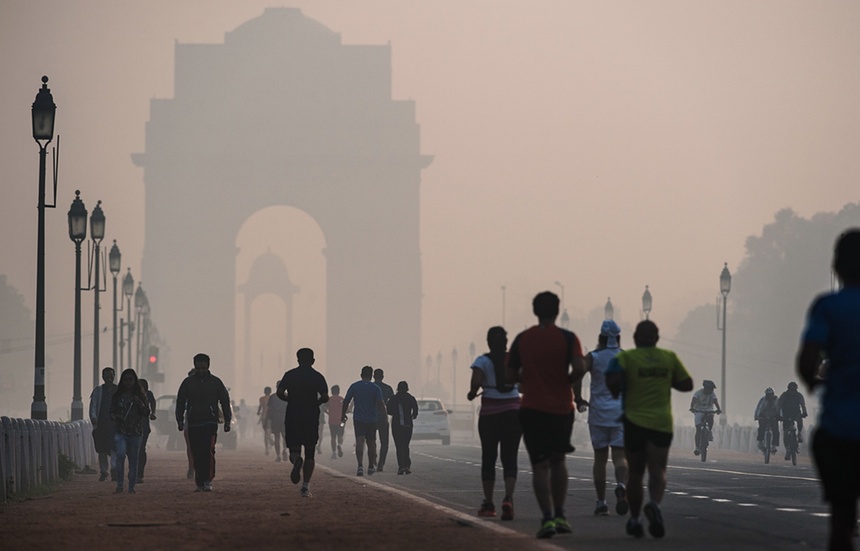AAP Govt. will award Rs. 2 crores to greenest solution to Delhi air pollution

Ruling AAP government in Delhi has come up with a smart idea to reduce rising air pollution in Delhi. The Chief Minister Arvind Kejriwal has announced that government will fund Rs. 2 crore into any start-up or researchers, student, organizations, teams etc. that will suggest most innovative, promising and efficient method to address energy and environmental challenges in Delhi.
On Twitter, AAP government tweeted, “Delhi Government will provide seed funding of Rs 2 crores for the best idea, test it and scale it up across Delhi to combat pollution.”
The aim of the initiative is to invite community participation or individuals to come forward and pilot their ideas that could address gigantic issue of pollution on a big scale.
Delhi, in partnership with the University of Chicago Laboratory Schools, has opened up the “Urban Labs Innovation Challenge: Delhi”. AAP had formed the Delhi Dialogue Commission that will work in collaboration with the Energy and Environment Lab at University of Chicago, Urban Labs and the Energy Policy Institute at University of Chicago’s Centre in Delhi (EPIC-India) to implement the selected idea.
A panel of eminent leaders, policy makers, and subject-matter experts will evaluate the components of the programs and recommend chosen ones to a committee comprised of representatives from University of Chicago and Delhi Dialogue Commission. The committee will pick the final idea to be funded.
The On Monday, the capital city of India Delhi witnessed one of the season’s worst smog spells. The Particulate Matter (PM) 2.5 level was 530 mcg/cubic, which is way beyond the safe level defined by the WHO. The smog was so thick that it was impossible to see beyond 500 to 800 meters.
The pollution reading in Delhi went over 500 units since yesterday. It’s the maximum that can be recorded by the scales of Pollution Control Board. That simply means that PM 2.5 level in the air is about 10 to 16 times higher than what is considered safe.
In view of mounting pollution in last 24 hours, the ruling government even suggested shutting schools in Delhi so that children could stay home to avert hazardous and irreversible health damages.
In a statement to press, Ashish Khetan, Vice-chairman of Delhi Dialogue Commission, an advisory body of the AAP government said, “If the pollution levels reach a point where it can cause irreversible health damage to people, we have to shut down schools and markets… and I think it has come to that point now.”
The step was, perhaps, motivated by similar precaution taken by Beijing after an ‘orange pollution alert’ was issued recently. All outdoor activities including that in schools have been suspended and residents were warned to stay indoors
According to a report on The Guardian,
“On an average day, the residents of the Indian capital breathe air fouled by fine particles at a concentration of 153µg/m3. This is close to three times the Beijing mean and 15 times the WHO guideline of 10µg/m3. In Delhi, the fumes from 8 million cars, small-scale diesel electricity generators and surrounding coal plants have damaged the lung function of half the city’s 4.4 million children so severely that they will never fully recover. There is no escaping this chemical haze. Doctors have begun prescribing that patients simply leave the city.”
However, Delhi Pollution Control Board, as expected, tried to dismiss the suggestion saying, “Can somebody say that pollution levels at home are better than pollution levels in school? Such knee-jerk reactions are of no use. The need of the hour is to tackle the problem, but not through hypocrisy and fear.”
Although, Prime Minister Narendra Modi has pledged to increase nation’s renewable energy generation from present 4 GW to 175 GW (100 GW of Solar Energy + 75 GW of Wind Energy) by 2022, but he has made it clear that India will not compromise with use of coal as main source of energy. Coal is among the major causes of emission and India’s industrialization and urbanization will, definitely, ask for more power. So, India is trapped in a web of preferences and environment doesn’t seem to be in its list.


